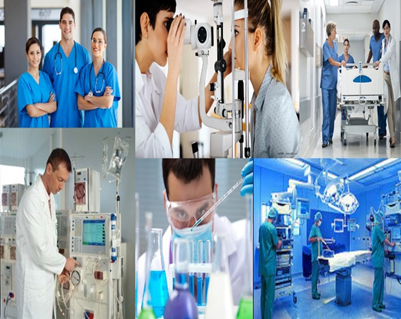
Didn’t Appear For Neet? Want To Become A Health Care Professional?
Explore The Vast Opportunity In Allied Health Care Services!!
Today, when the world is fighting the most grim healthcare crisis as COVID-19, the healthcare system requires the trained and skilled workforce to take care of the physical, mental, social, emotional, and holistic well-being of those who seek acute and chronic medical attention both at the healthcare facility or at home. These workforces are multidisciplinary and include; Doctors, Nurses, Allied Health Professionals, and other Ancillary Supporting Staff, who are directly or indirectly involved in the care of patients with COVID-19. In this multidisciplinary team, the allied health professional role becomes very important and vital in restoring the patients’ health. The ‘allied health professionals’ function with the interdisciplinary team and play a major role in almost all the areas and department of the hospitals such as; outpatient, inpatient, medical imaging, medical lab, therapy areas, ICUs, wards, rehabilitation areas, emergency, and casualty, etc.
For example, the medical laboratory technologist provides scientific support in diagnosing the case with the clinical laboratory; physiotherapist, occupational therapist and Audiology & Speech-Language Pathologist offer numerous rehabilitation services during and after the ailment; health information managers and health data analyst provide patient data for seamless patient care; medical imaging technologist operates sophisticated diagnostic imaging equipment and generates report require for continuous care; public health professionals contribute for improving public health outcomes; respiratory therapist performs respiratory care modalities in ICUs and take care of patients respiratory dysfunction, clinical nutritionist decide on the diet and suitable food intake for improving the health and immunity of the patient. Likewise, many other allied health professionals with their specialized skills, support the entire healthcare team in treating and restoring the patient’s health, and improving their quality of life.
This year has taught us the importance of health-care professionals, they have acted as saviours for us.
Healthcare is one of the most noble professions and a booming career, because the demand for doctors or medical practitioners is never going to decrease. There are a number of medical courses which you can take up to enter the medical industry, such course are Allied Health care courses, which can be pursued without appearing for NEET.
WHAT ARE ALLIED HEALTH CARE COURSES?
Allied Health Practitioners are a separate group of health practitioners who apply their skills to prevent, diagnose, treat and rehabilitate people of all ages and all specialties from transmitting diseases. They will provide direct medical care, recovery, medication, diagnostics and health development measures along with a range of technical and support personnel to recover and sustain optimum physical, sensory, psychological, cognitive and social functions. Allied health care deal with all sorts of medical diagnostic techniques (e.g. blood analysis, histopathology, pathological analysis, radiography) that are used in the medical field and are very relevant for patient care. The role of allied health workers in providing effective care has become critical with diagnosis based on technology.
WHAT ARE SOME OF THE COURSES UNDER ALLIED HEALTH CARE SERVICES?
Here is a list of popular courses in this field:
- GNM (General Nursing and Midwifery)
- **B. Sc Nutrition & Dietetics
- B. Sc Radio-Imaging Technology **
- B. Sc Neuro-Physiology Technology
- B. Sc Operation Theater Technology **
- B. Sc Medical Laboratory Technology
- B. Sc Cardiac Care Technology
- B. Sc Renal Dialysis **
- Master of Optometry
- M. Sc Nutrition & Dietetics
- M. Sc Radio-Imaging Technology
- M. Sc Operation Theater Technology
- M. Sc Medical Laboratory Technology
- M. Sc Microbiology
** The above mentioned courses can be pursued as Diploma’s as well
WHAT IS THE ELIGIBILITY TO PURSUE A CAREER IN ALLIED HEALTH CARE?
- Students planning to pursue Allied Health Course as bachelor program must belong to the science stream in class 12. Students planning to pursue diplomas can be of any stream.
- Biology is an obligatory subject for certain related medical disciplines.
- Applicants are shortlisted for admission to good institutions based on their results at the +2 level. Therefore, a high aggregate percentage is significant. So, in all subjects, the student should strive to score high. Biology may be given special importance as some courses separately require a good score in biology.
- To be able to evaluate and interpret data and take decisions, Allied medical science students should learn strong critical thinking capacity and research skills. To take up this career area, the ability to persevere in difficult conditions and strong physical endurance are both necessary requirements.
- Most institutions demand a minimum of 50 percent or above in aggregate for admission to undergraduate courses. Students who want to pursue diploma should have passed class 10th.
- In Biology, some courses may also require a separate minimum 50 percent requirement.
- Indian universities also conduct entrance examinations as a part of the admission process.
- Universities abroad might ask for proficiency tests like IELTS, GRE, TOEFL, SAT, ACT, etc. depending on the course you are applying for.
WHAT ARE THE AREAS WHERE ALLIED HEALTH PROFESSIONALS WORK?
In order to associate the symptoms with the diagnosis and to treat the patient correctly, these professionals are actively interested in proper examination and diagnosis of the diseases. They consist of both technicians and supervisors. Some of the areas where they work are-
- Nursing
- Optometry
- Physiotherapy
- Audiology
- Perfusion Technology
- Pharmacy
- Cardiovascular Technology
The U.S. Bureau of Labour Statistics (BLS) estimates that, relative to most other professions, healthcare-related careers are out for a higher growth rate. Over the last decade, advancements in technology have produced a dramatic change in the general viewpoint of the healthcare industry. The positions of paramedical practitioners and technologists are no longer considered to be the prerogative of physicians and nurses with greater significance. In addition, a greater range of opportunities are now available in higher-level studies and study areas related to Allied health services.
Job prospects for clinical laboratory technologists are likely to surpass the trained professionals available, as doctors rely more and more on diagnostic laboratory tests. The growing demand for surgical assistants and OT technologists is being increased by the use of surgical procedures for the treatment of diseases in an ageing population.
The future of the healthcare industry completely lies in the hand of allied health professionals but due to the dearth of the trained and skilled allied health workforce, many hospitals are facing challenges in providing quality healthcare to the patient. This is due to the reason that the number of allied health institutions in India is less and the number of graduates it produces is not sufficient to satisfy the demand of the healthcare industry. The gap can only reduce if the medical institutions can come forward and start allied health programs.
We hope this blog has cleared all the doubts related to the Allied Health Care courses. Do you want to pursue any of these courses and fulfil your dream to be in the medical profession?
Secure your future by obtaining a thorough career guidance with the help of experts at MedStudies.
Register for a free counselling session today

